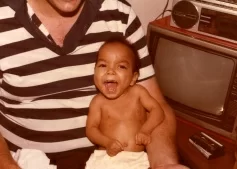 without a thought on my part. But Luke came to my mind yesterday and I looked up some information on him and discovered that his birthday had just passed. I found this old article that I wrote about Luke a few years ago. I thought I'd share it again. I am convinced that there are important and significant lessons we can learn from his life, and that I need to regularly share what I think they are. I hope you enjoy this!
without a thought on my part. But Luke came to my mind yesterday and I looked up some information on him and discovered that his birthday had just passed. I found this old article that I wrote about Luke a few years ago. I thought I'd share it again. I am convinced that there are important and significant lessons we can learn from his life, and that I need to regularly share what I think they are. I hope you enjoy this!The mysteries of God are a part of the Christian life that can often lead to confusion, doubt and even discouragement for believers.
- For some, it's a pride thing. We want to have answers – we want to understand, to be able to grasp the complexities of Biblical truth and God's plan for mankind.
- For some, God's mysteries – the unexplained things of life – are stumbling blocks to faith:
1. Why do bad things happen to good people?
2. Why does He allow pain, suffering and evil to thrive in our world?
Several months ago we were witnesses to the aftermath of the tragedy in Pennsylvania involving the Amish community, where, good, decent, hard working, non violent people were subjected to unspeakable cruelty towards their children. How can this happen?
3. One of our CSC children, who grew up in the worst poverty imaginable in Cebu City, was adopted into a family in the United States several years ago. Well meaning people would tell her how lucky she was and how God obviously had a wonderful plan for her life. She had a hard time with that and would sometimes ask her parents, "But what about all the kids who are still there, who weren't adopted, and who are still suffering and dying? What is God's wonderful plan for their lives? Why me and not them?
For many of us, we celebrate the goodness of God in our lives, we praise him for his healing, for material comforts, for blessing our efforts – even as we observe people who remain sick or disabled, who suffer in poverty – those who efforts and initiatives end in disappointment and ruin.
There are two extremes in terms of people's reactions to the things about God and life that are not understood.
1. There are those who try in vain to grasp the ungraspable – to be able to reduce the mysteries to understandable formulas or explanations. I remember a young seminarian who came to Cebu and who filled the pulpit of our church on a Sunday evening. He preached for an hour on the "peace of God that passes all understanding." Perhaps he felt that if he preached long enough he could crack that nut and open our understanding!
We all know those who have reduced the book of Revelation to precise charts and timetables, giving us easy to understand categories for all of human history and, most especially, the times to come.
2. A second category are those who shake their heads and say, "We'll only know these answers when we get to heaven." They suspend inquiry, not bothering to seek answers to the perplexing questions of life.
Living and working in a Third World country like the Philippines brings some of these mysteries to the front of our lives. Poverty, and all that goes with it, is "in your face." People often ask me "How do you like living in the Philippines?" That's a tough one to answer. Life anywhere has its highs and lows. Some days are great, others are difficult. I often answer this way:
1. When I'm sitting down to a nice breakfast I am aware that, within a few meters of my house are families that have no breakfast.
2. When I'm driving to the office or the Shelter I often pass people walking along the road who, for lack of a few cents can not even afford public transportation and must walk.
3. When I stop to buy medicine for my family or the CSC kids, there are people standing nearby whose children are dying for lack of that very same medicine.
Why am I blessed and they are not?
I recall a conversation with a missionary a few days after Cebu was hit by a strong typhoon. Many of our CSC workers lost their roofs or their entire homes. The houses of the poor were devastated by the high winds and torrential rains. The missionary said that it had been such a miracle how God spared the missionary homes from damage, holding his hands of protection around us during the storm. I remember wondering whether it wasn't more a matter of our having cement houses and strong metal roofs.
Why did our CSC kids have to suffer so much? And how much more, those who live on the street and cannot be admitted to CSC?
These are tough questions. When it comes to trying to understand our own suffering, the Bible gives some answers. For example, Romans 5:3-4 tells us that suffering produces perseverance, perseverance character, and character, hope. And the Bible gives us additional hope that we will someday come to see God's purpose and mysteries:
"But now we see through a glass dimly, but then face to face."
And we hear the testimonies of Christian brothers and sisters who have lived through terrible times and have turned negatives into positives in their lives.
Several months ago I was attending a conference in Bismark, North Dakota. One of the featured speakers was Steve Saint, Steve's father, Nate Saint, was one of the five missionaries killed in 1956 by Aucan warriors in Equador. Steve told about what that tragic day meant to his family, and what it was like when his dad, his hero, didn't come home that day. We saw video of his current family life, and saw a man who was interacting with Steve's children, and who was being referred to as "Uncle." It turns out that this was the very man who had killed Steve's father, who had come to know Jesus and had experienced the forgiveness of God and of the Saint family and now was a part of their family – an amazing story of how good things had come out of tragedy and suffering.
So the clear message is that God has a plan for our lives, we will discover that plan in the right time. He is writing our life's stories, but some of the chapters are difficult ones.
We can understand this. We can, when aided by the Holy Spirit, see how difficulties and suffering are part of a purification process for us, and that we, like Job, will eventually be better people for it.
But what about people who, because of major disabilities, are unable to understand their situation, unable to discern the hand of God or his plan for their lives. Where is the purification and growth and ultimate value for these people? What could God's purpose possibly be?
Back on 1982 a baby was born in a charity ward in a small hospital in Cebu City. 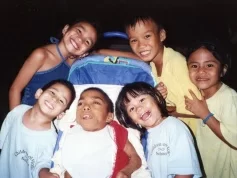 The baby underwent cardiac arrest during birth and was without oxygen for an extended time. Unlike many cases of charity patients, the hospital staff decided to resuscitate the baby, even after he had suffered massive brain damage and cerebral palsy. The baby's mother abandoned him in the hospital, and after a couple months Luke was referred to CSC. When we took him in he appeared to be a bouncing baby boy. We did not know that he would not develop physically beyond about a year and a half, or mentally beyond a few months. Luke would never speak, nor have voluntary movement of his arms or legs.
The baby underwent cardiac arrest during birth and was without oxygen for an extended time. Unlike many cases of charity patients, the hospital staff decided to resuscitate the baby, even after he had suffered massive brain damage and cerebral palsy. The baby's mother abandoned him in the hospital, and after a couple months Luke was referred to CSC. When we took him in he appeared to be a bouncing baby boy. We did not know that he would not develop physically beyond about a year and a half, or mentally beyond a few months. Luke would never speak, nor have voluntary movement of his arms or legs.
Luke became a fixture at CSC. For over 23 years he was an integral part of our lives and a symbol of CSC and what we are all about.
Many times Luke would be hospitalized – often due to upper respiratory infections. He fought for his life many times. There were at least a dozen times when we were sure that he would die. The doctors had told us that he wouldn't make it past five years old. Then they revised it to nine, then 11 – certainly he wouldn't reach his teenage years.
One time, when Luke was critically ill our staff met to pray and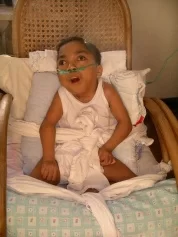 I asked them to reflect on his life. Here is why: I believe that God had a purpose for Luke's life when he created him. I believe that He uses people like Luke to teach us important things. But here is the rub: If we don't spend time reflecting on these lessons, then Luke's life is useless. Its up to us to allow God to make sense of Luke's life.
I asked them to reflect on his life. Here is why: I believe that God had a purpose for Luke's life when he created him. I believe that He uses people like Luke to teach us important things. But here is the rub: If we don't spend time reflecting on these lessons, then Luke's life is useless. Its up to us to allow God to make sense of Luke's life.
And what are the lessons that we found? What has God taught us through his life?
1. First, life is precious. Even though he had nothing to live for, from the world's point of view, Luke clung to live almost ferociously. Some of us who have much more to live for take life casually, we take life for granted. Not Luke. Every day was a struggle. Every breath had to be fought for. Life is a gift from God and we should treat it carefully.
2. God has provided us with opportunities, through Luke's life, to minister to him in significant and life-saving ways. He has provided an avenue for us to live out the biblical mandate to minister unto the "least of these," because, truly, Luke was in that category. Hundreds of people have been given a blessing to participate in the support of CSC that reaches out to children like Luke and many others with other special needs.
3. In so doing, He has given us a chance to show others a Godly value system that doesn't reserve love and attention for those who have something to give back, or who have "potential" or a bright future. For many people who live in a developing country, where resources are limited, this has been a difficult lesson to learn. How could we justify spending so much money for Luke's hospitalization when other, "normal" kids needed care? Luke's life gave us the opportunity to teach about the value of life and about how God looks at all of us.
4. Luke has been a tremendous ambassador for CSC. People around the world remember observing the loving care that he received by our staff and workers. They remember his famous smiles. They may quickly forget the names of the staff or other children, but they remember Luke. "How's Luke doing?" we get asked wherever we go to talk about the ministry of CSC. And our care of Luke helps us explain the true nature and core values of our work in the Philippines.
5. Luke has been a safety valve for those that had an opportunity to know him. My job as Field Director of CSC involves lots of administrative chores, like making budgets, government relations and various kinds of problem solving. There are days when I get stressed out and start to feel the weight of the world on my shoulders. But all I needed to do is to drive a few short miles to where Luke lived, to hold him in my arms, and I get a clear picture of what real struggles are all about. My struggles paled in comparison to what Luke faced every day. Self pity may be easy for some people, but those that knew Luke have no excuse for feeling sorry for themselves. What a great gift that was to all of us.
A little over a week before we left Cebu, Marlys called me on my cell phone and told me that I should get to the hospital quickly, as Luke wasn't doing well. He had been hospitalized for over a week and his breathing was bad. I had gotten messages similar to this one throughout Luke's life, so I went to the office and took care of a few things. But the Lord laid it on my heart to go see Luke and when I entered his room his breathing was extremely labored. He looked different than I had ever seen him, and it became clear that he was dying. I sat down next to him, kissed him and looked into his eyes. For 23 years we had loved this boy. It wasn't easy to say goodbye. I said to him, "Luke. You can go. Go to be with Jesus, Luke. I love you." Within a couple of minutes Luke took his last breath. 23 years of pain, suffering, limitations, hospitalizations, forced breathing, skin rashes and infections were over. We would never see Luke's smile again.
As Luke was dying in that hospital room, I made a promise. I'm not sure if I was making a promise to Luke, to God or to myself. But I decided then and there that I was going to talk about Luke on our coming furlough. I believed then and do now, that the church of Jesus Christ needs to hear about Luke, that the lessons of his life are important ones. Many Americans are complainers - full of self pity. People who have so many material comforts are unsatisfied. American discourse is increasingly a chorus of victim and entitlement claims. Charles Sykes, in his book "A Nation of Victims: The Decay of the American Character" states that, "in a nation where everyone is a victim, no one is a victim." In our preoccupation with our own needs we have a hard time seeing the needs of others – people like Luke.
In his song "God Help the Outcasts," the Hunchback of Notre Dame poses several difficult issues:
I don't know if there's a reason
Why some are blessed, some not
Why the few You seem to favor
They fear us, flee us,
Try not to see us.
The first part we have already examined. The second is our call to arms. "Why the few You seem to favor, they fear us, flee us, try not to see us."
I don't know what factors might make it difficult for us to see the needs of society's outcasts. Perhaps we are too busy. Maybe our personal and church calendars are so full that there just isn't room for Luke, or the man who had fallen to thieves at the side of the road, to break into our day. Maybe we are numbed or fatigued by the needs of others, or simply overwhelmed by the circumstances of our own lives. Maybe we have become cynical. "Why did that guy travel this road at this time carrying that amount of money? He deserves what he got!"
Maybe, just maybe, Luke can help cut through the apathy, the self-centeredness and cynicism of our lives. He was a person with significant needs that he didn't cause. He was totally dependent on others to live. His life had none of the possibilities and opportunities that we take for granted every day. He needed us so very much. Maybe Luke can serve as a symbol of many others that we come into contact with. Maybe Luke can help us rescue our lives.
Banquet Excitement
As banquet preparations move into full swing in Minnesota, the staff and workers here in Cebu are also getting excited for the big event. We know how much work goes into the evening, and how important it is to CSC. We are involved in some of the planning, in preparing the media and in praying for the banquet. Some of us have been to past banquets and know how much fun it is and how our friends and supporters enjoy getting together and celebrating this ministry. We are there in spirit.
I remember last year we were crowded in the office conference room early on Sunday morning to watch the banquet live via Skype. We knew what was going to happen and had already seen the videos and slide shows. But hearing the spoken words and getting a feel for the energy in the room was moving for all of us. When the banquet total was announced (a record for CSC banquets!) there was a gasp in the room, followed by shouts of joy and many tears. We are together with our stateside staff and all you supporters who make this ministry possible. You won't see us on the 22nd at Bethel, but you still might feel our presence in the Robertson Center.
Showing appreciation/Giving thanks
One of the values that guides CSC is especially important to me. We need to be thankful people. And we need to express that thanks. It starts with hearts of thanksgiving to God, the Giver of all gifts. Even though we may thank Him regularly in personal or family prayers, it is important to be intentional about group times of thanksgiving, like staff or team meetings or through corporate prayers at church or small groups. At CSC we need to unify our thinking around thankfulness, because, without God's provision, our efforts are just not enough.
But we also need to be thankful to those around us. At CSC, we need to continually express our thanks to those who support us financially and through prayers. In many ways, this kind of thankfulness is an organizational lifestyle. Every gift should be acknowledged and in a timely manner. The personal touch is important; we should send personal notes with receipts. We are even working on sending occasional thank you notes from the staff in Cebu, when possible. Every form of thanks is important and beneficial because, without the provision of our friends, the efforts of the staff are just not enough.
Here in Cebu, we are aware of the need to teach thankfulness to our CSC 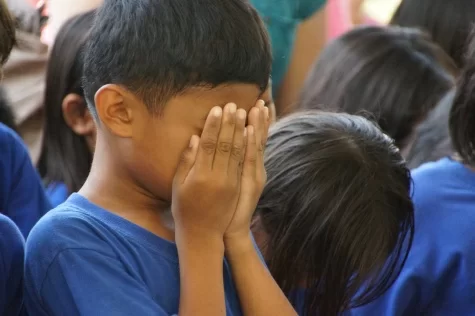 children. Although they have had difficulties in their lives, God has been good to bring them to CSC and to give them a second chance at family. People give sacrificially to help provide for their care. Aunties and staff show them kindness. The food is good and plentiful. Their medical needs are met. They have a great school to attend with loving and talented teachers. And many of them will eventually go to an adoptive family that will open their homes and lives to them. We need to help build a foundation of thankfulness for their lives that will help them understand their debt of gratitude to God, CSC and their adoptive families. I wish you could join our kids for their nightly prayers with their houseparents or a staff member. They almost always remember to thank God for our dear supporters, as they should. The kids know that it takes a lot of money to keep CSC going and to allow them to live in a healthy and comfortable way. And they know where it comes from.
children. Although they have had difficulties in their lives, God has been good to bring them to CSC and to give them a second chance at family. People give sacrificially to help provide for their care. Aunties and staff show them kindness. The food is good and plentiful. Their medical needs are met. They have a great school to attend with loving and talented teachers. And many of them will eventually go to an adoptive family that will open their homes and lives to them. We need to help build a foundation of thankfulness for their lives that will help them understand their debt of gratitude to God, CSC and their adoptive families. I wish you could join our kids for their nightly prayers with their houseparents or a staff member. They almost always remember to thank God for our dear supporters, as they should. The kids know that it takes a lot of money to keep CSC going and to allow them to live in a healthy and comfortable way. And they know where it comes from.
Thank you for visiting our site and for reading this blog. Thanks for your interest in CSC and for the gifts and prayers that you might be willing to offer to help us love and care for these children. Thank you so much!
First Place
Every year CSC participates in the Adoption Awareness week in Cebu, which is a program of the Department of Social Welfare and Development. One of the features this year was a competition between children from various agencies that are involved in adoption or foster care. It was a Draw and Tell contest where the competitors draw a picture depicting the theme of "Spread Unconditional Love Through Legal Adoption," then describe what they drew. CSC was represented by Jerald, a 10 year-old boy who has lived at CSC for eight months. Prior to coming to live with us he had not had much in the way of consistent schooling. But he is a talented boy and, with the encouragement of Teacher Cora, he did a great job. He won the contest! Lots of excitement around Children of Hope School, CSC and the Duterte Home. And Jerald's smile was the highlight of everything.
HR for CSC
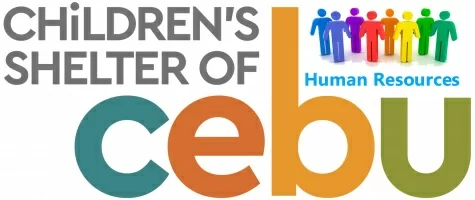
This is certainly a season of change for CSC. We have new staff, new policies, some new job descriptions, a new organizational chart and some refurbished facilities. Although our ministry remains the same - caring for homeless children with the love of Jesus - we have some new ways of doing things.
And we have an entirely new department! We will soon be launching our new Human Resources Department. We have been talking about this for some time. With more than 125 workers, the need for HR is obvious. Finally the pieces are in place and we will soon be hiring an HR Director. We already have the office space created. Soon the department will be fully in place and we are really excited about what this will mean for CSC, our workers and, ultimately, the children we care for. We know that having an HR department will help us do a better job of servicing our employees, seeing to their compensation, training and morale. We want our workers, who are the backbone of the ministry, to feel more connected to each other, and to feel better about their part in the success of the ministry.
Many thanks to those whose hard work helped lay the groundwork for establishing this department, specifically Joel Reasoner, Peter Arneson, Marcel Pacada, Mitch Ohlendorf and Jake Schulz.
Thanks to everyone!
Once again our faithful supporters rallied around CSC and helped us make our budget at the 11th hour. Actually, it was more like the 12th hour. Matt Buley and Jill Grasley had kept us abreast of the situation and what we needed for income during the last few days of the year. It seemed insurmountable, but somehow the money came in and we reached our income goals for the year! Thank you to everyone who gave at year-end, and throughout the year.
There are lots of changes around here! We have new staff, a refurbished office, some new kids and some new plans and procedures for the coming year. What remains the same is our commitment to providing the best care possible for the kids that come into our homes. That has remained the same for 37 years. And our confidence in moving forward is grounded in the reality that our supporters are faithful and true. And generous. And amazing.
To our supporters, thanks for being a part of this ministry and what CSC means to the children who call this place home. Thanks for caring, for praying and for giving.





